Gatchaman Crowds insight
Episode 10
by Nick Creamer,
How would you rate episode 10 of
Gatchaman Crowds insight ?
Community score: 4.4

Gatchaman Crowds insight doesn't really have a villain.
You'd think the villain would be Gelsadra. He's the one who's ostensibly created the dystopian modern Japan, and he's responsible for the existence of the unity-craving Kuu-sama. But Gelsadra didn't really have to work that hard to bring all of that about, and doesn't seem particularly invested in maintaining any kind of power. When Rizumu interviews Gelsadra regarding the Kuu-sama, he happily reveals that he's never seen them before, but that they seem intent on absorbing people in order to make everyone come together as one, and that seems okay to him. When people are understandably mortified by these words, he seems confused. Wasn't he just doing what everyone wanted? Well, if people want him to go away now, then he guesses he'll do that.
Gelsadra just doesn't seem like satisfying villain material - he's basically always willing to reflect what other people want, and surrenders without any resistance (once he's sure that his original system isn't what the most people want anymore). So maybe the finger could be pointed at Tsubasa, then? She certainly exemplified the harsher and more opinionated end of Gelsadra's vision, refusing to engage with those who disagreed with her beliefs. But when Tsubasa learned about the Kuu-sama's powers, she was as horrified as anyone, and in this episode, she ultimately breaks down and cries when she realizes the consequences of what she's done.
Repentant crybabies don't generally make great villains, either. And I can't say Rizumu seems like an appropriate villain, even if he's definitely got the attitude for one. Rizumu's a smug and self-absorbed jerk, but he's more a side dish of villainy than a proper mastermind. He trades in easy dismissals of human weaknesses, but it's his manipulation of atmosphere (a trick Jou had abandoned in disgust after the election) that ultimately dismantles Gelsadra's dystopia. Rizumu understands how group thinking works, and so he uses classic tricks to change the tide - a crying girl, a loaded interview, and a thousand howling commenters all setting the terms of discourse. As much as he'd like to appear above the fray, Rizumu isn't a foreign agent; like the Kuu-sama and the atmosphere they represent, he's an instinct within human nature that will always exist.
If anyone's a “villain” in Gatchaman Crowds insight, if we can point any fingers outside of the ones pointed at the general weakness of humans surrendering to communal atmosphere, I think I might point them at good old Millione. Millione's the one who broke the news of Kuu-sama possibly not being such great guys; but it wasn't through an impassioned and well-reasoned counter-argument, like the ones Rui is so fond of. It was because the danger of the Kuu-sama made good television. Who isn't inspired to action by the sight of a young girl crying on TV? Yeah, sure, the Kuu-sama's politics may have been horrific right from the start, but when you see a little girl crying like that, who can help but finally realize they've been living in a dictatorship without even noticing it? Anyway, enough about politics, time for commercials.
Of course, Millione isn't anything “foreign” to our nature, either. Twenty-four hour news networks, the systems through which we have essentially turned the politics that dictate our world into game shows featuring easily understood variables and constant entertaining soundbites, exist because we want them to exist. Millione tweaking his show to always reflect the popular opinion isn't any different from news reports that frame critical political issues as debates between roughly equivalent sides, even when one side has all of the actual evidence and facts, because conflict makes for better drama and more “fair-seeming” reporting. Everything that happened in this week's insight, and everything that has happened in this show in general, has already happened before. As Tsubasa's grandfather explained to her, he only recognized the danger of atmosphere because it reminded him of the war, where it was ultimately the death of his own brother that brought him to his senses. It is all too easy to think in communal terms, and in order to break free from the thoughts of the group, you generally need to be shaken awake on an individual level. Tsubasa was shaken before, when she realized she and Gelsadra didn't actually agree on things. Rui and Gelsadra were each shaken this episode, when X and Hajime each challenged them to decide what they really seek.
At the end of this week's episode, Gelsadra finally gets his own thought bubble. Spewing out all the opinions he felt he needed to follow, he finds himself back in his child form, left with one original thought: “I want to see Tsubasa again.” In spite of this season featuring multiple terrorist attacks and a thoughtcrime dystopia, its final conflicts are turning out to feel a little bit low-stakes - the Gatchaman have to beat up the Kuu-sama, and Gelsadra wants to go see his friend again. I wasn't happy with how everything resolved in this episode - I feel like Rui's collapse and final rise were both not well-integrated with the rest of the story and too similar to Tsubasa's arc, and the ending just isn't feeling quite as climactic as I'd hoped. But if the ultimate message here revolves around embracing a personal truth and the people you can trust to share it with, I think I'll be okay with that.
Rating: B+
Gatchaman Crowds insight is currently streaming on Crunchyroll.
Nick writes about anime, storytelling, and the meaning of life at Wrong Every Time.
The views and opinions expressed in this article are solely those of the author(s) and do not necessarily represent the views of Anime News Network, its employees, owners, or sponsors.
discuss this in the forum (95 posts) |
back to Gatchaman Crowds insight
Episode Review homepage / archives